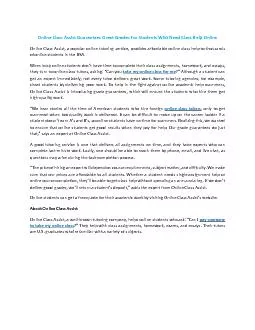PPT-Class 36:
Author : lindy-dunigan | Published Date : 2015-10-23
Proofs about Unprovability David Evans University of Virginia cs1120 Story So Far Much of the course so far Getting comfortable with recursive definitions Learning
Presentation Embed Code
Download Presentation
Download Presentation The PPT/PDF document "Class 36:" is the property of its rightful owner. Permission is granted to download and print the materials on this website for personal, non-commercial use only, and to display it on your personal computer provided you do not modify the materials and that you retain all copyright notices contained in the materials. By downloading content from our website, you accept the terms of this agreement.
Class 36:: Transcript
Download Rules Of Document
"Class 36:"The content belongs to its owner. You may download and print it for personal use, without modification, and keep all copyright notices. By downloading, you agree to these terms.
Related Documents














